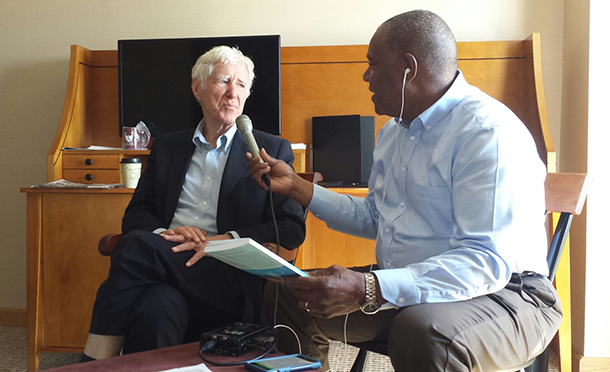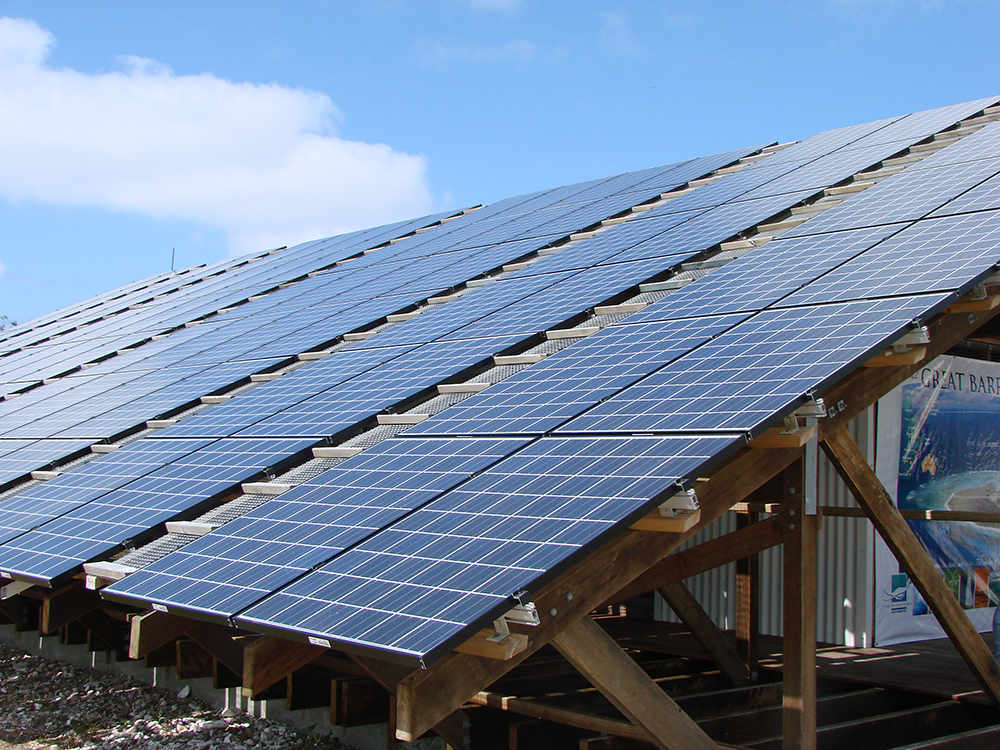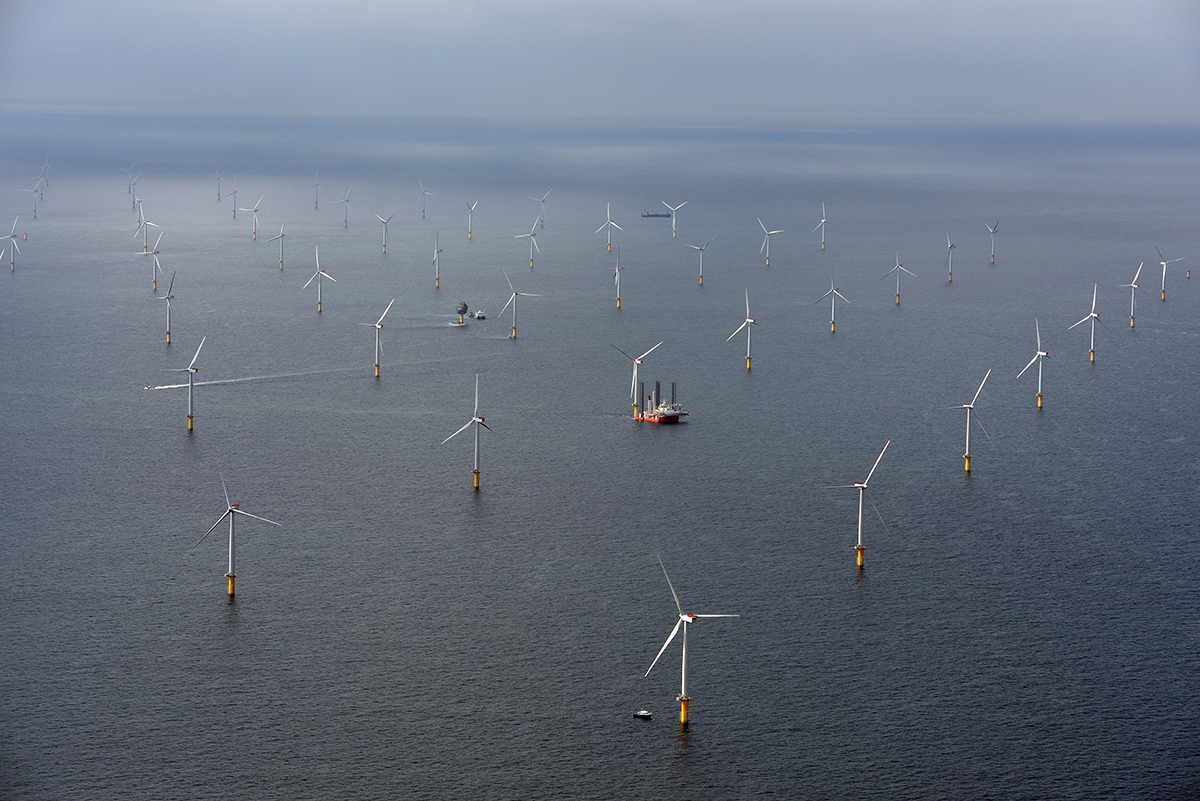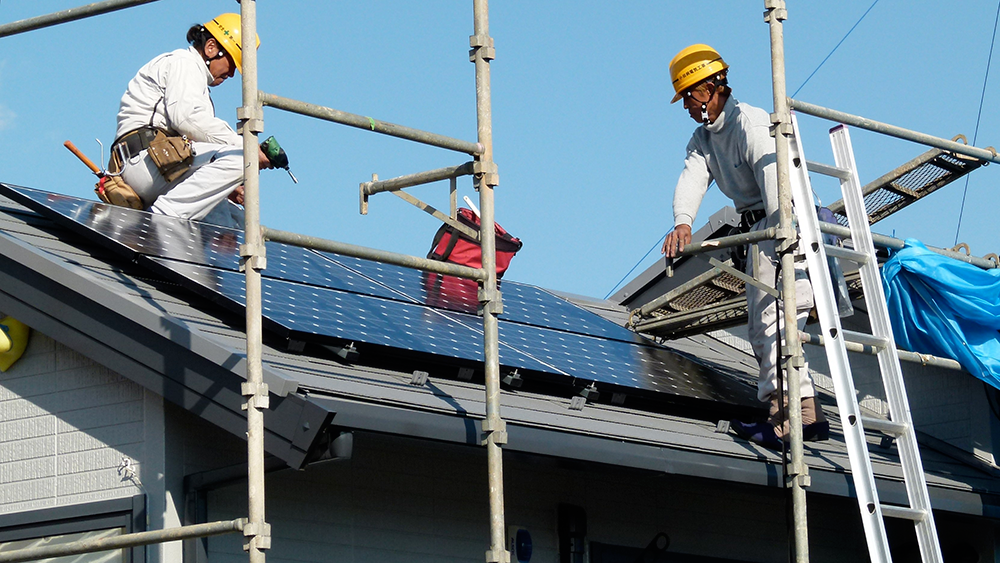The Great Transition to Renewables
Air Date: Week of May 22, 2015

Lester Brown speaks with host, Steve Curwood (Photo: Matt Roney)
In his new book The Great Transition, renowned environmental thinker Lester Brown describes the transition from a fossil fuel economy powered by oil and coal, to a renewable economy based on solar and wind. Brown tells host Steve Curwood that renewable technologies are already cheaper than fossil fuels in many places, and the great energy transition may be complete much sooner than you think.
Transcript
CURWOOD: It's Living on Earth. I'm Steve Curwood. If you saw Lester Brown in his characteristic uniform of impeccably pressed suit atop running shoes, you might not guess he has a couple of dozen honorary degrees for his environmental analyses. He’s a MacArthur genius, “one of the world’s most influential thinkers”, according to the Washington Post, and he founded both the Worldwatch Institute and the Earth Policy Institute. And environmental trendspotting is precisely what Lester Brown does in his latest book, "The Great Transition". Welcome back to Living on Earth, Lester.
BROWN: My pleasure, Steve.
CURWOOD: So, you call this the great transition, shifting from fossil fuels to solar and wind energy, but in your mind is this great transition?
BROWN: Well, I look at it in a historical context. We've had energy transitions before. We went from wood to coal, then coal to coal and oil. And now we're going from coal and oil to solar and wind. And the exciting thing about this is how fast it's going to happen. I think we're going to see a half-century of change compressed in the next decade and this is partly because the market’s beginning to drive this transition. In many parts of the US now you putting solar panels on your roof will give you electricity at a cost well below than you can get at the local utility. So more and more people are putting solar panels on the roof so they can get cheaper electricity, and this is putting the utilities in an awkward position because as the number of their customers diminish they have to charge more for their electricity and in so doing they encourage still more people to put panels on the rooftop. So this is called sort of the death spiral for utilities, but it represents a fundamental change because we’re seeing this shift to solar and wind which means away from coal, which is an exciting part of the energy transition.
CURWOOD: What you think are the biggest obstacles to having this transition occur as quickly as a decade?
BROWN: Well, the utilities are trying to figure out ways of putting a tax on or some sort of a charge on the panels that people put on their rooftops. The fossil fuel industries know that this could in a sense be the end for them, and so you have the big oil companies who for the last century have had an ever-growing market for oil and suddenly that market is starting to shrink so they’re -- it reminds me of a deer caught in the headlights at night; they just don't know where to go. The people who work for oil companies have spent their careers in a period of growth, always more, more, more, and suddenly it's less now and that's a major shift and a major adjustment within the energy sector.
CURWOOD: On a number of college campuses and at various endowments and foundations folks are divesting of their holdings and fossil fuels and there’s a social movement along these lines. Your views of the movement?
BROWN: The divestment movement is sort of the social manifestation of the desire to accelerate this transition from fossil fuels with all the problems they bring and air pollution and climate change and so forth to basically to safe fuels like solar and wind. It's interesting to see how it is growing and it started with a few universities and it's now gone to churches and various social groups. It's just so many organizations now beginning to work on this divestment campaign that the oil and coal industry are concerned and they should be.
CURWOOD: Let's say that you're in the boardroom of Exxon or Chevron or BP and they said, "Mr. Brown, what should we do?"

In many parts of Australia, solar power is now cheaper than coal. (Photo: Aardvark Ethel, Flickr CC BY 2.0)
BROWN: I would say: “The world is changing, and you need a new business plan. Your business plan should not be designed to thwart the efforts to move to clean energy sources but have to become part of this”. They exist as corporations. They have experience in setting goals and reaching goals and they need to rethink their game plan. Otherwise, they're going to be history.
CURWOOD: Somebody listening to you might say, "All well and good Lester Brown that this transition is coming with solar and wind, but if I have solar cells what am I supposed do for power at night?"
BROWN: The good news is that there are exciting advances in batteries and we're seeing just in the papers right now that Elon Musk is going to be manufacturing batteries of a high quality on a scale we've never seen before, so batteries will help carry us through the night and it's entirely doable, I mean, we don't have to wait for any new technologies or any advances in the science of this. I mean there may be some that will make it easier and more feasible, but this is the way we're heading and I don't think anyone's going to be able to change that.
CURWOOD: Recently the governor of California, Jerry Brown, called for even tougher standards for emissions. He wants to reduce California's emissions now by some 40 percent - this is greenhouse gas emissions - by the year 2030. What kind of technological industrial progress do you think this move might stimulate?
BROWN: Well, what happens typically when California raises the bar on something - the efficiency of refrigerators, for example, if they say that they have to reach a certain level of efficiency which is well above the national average - then the refrigerator manufacturers have to decide whether they want to make two types refrigerators or just accept the California goal and go with it. So when California raises standard on fuel efficiency for something it really is kind of doing this for the country because manufacturers don't want to have to produce for two markets with different levels of efficiency. So we shouldn’t underestimate the effect of California on the country and indirectly on the world.
CURWOOD: Now, your book the great transition is in my view a quick read, a quick handbook for somebody who’s saying what's going on to kind of figure out what this territory is all about, actually really in the first 15 pages you have a pretty good summary about where things are going. Let's talk about some of the subsets in your book. First question is, how important is climate to all of this transition?
BROWN: Well climate is certainly one of the drivers, and for the last few decades it's been sort of the principal one along with air pollution that to get movement away from fossil fuels to renewable sources of energy. But now we have a third major force of work and that is the declining cost of solar and wind energy. Solar energy is now undercutting coal-fired electricity and in many situations, in many, many places. In fact in one of the states in Australia, for example, there's such a gap between the electricity generated from wind and from solar versus coal that even if the coal were free, the electricity would still not be competitive with solar and wind. And I mention that just to give a sense of how fast things are changing and why in Australia I mean it's almost an epidemic of solar panels appearing on rooftops.
CURWOOD: In this huge coal producing nation.
BROWN: Yes, Australia's an important coal producer and exporter, exporting into countries like China, for example.
CURWOOD: How's does that work in Australia? Give me the math here? Why is it cheaper to have solar cells than to get free electricity from a coal-fired power plant?
BROWN: Well, Australia is a country that's rather spread out and if you have coal you have to have a big plant to make it economic, then you have to build a huge grid to move it, and it's the cost of distribution, not the production of electricity that is the death-knell in many situations for coal-fired power.
CURWOOD: So if the power just has to come from your roof to your refrigerator that's a shorter distance.

Lester Brown says that a viable offshore wind industry is inevitable off the east coast of the United States. (Photo: Statkraft, Flickr CC BY 2.0)
BROWN: It is, and the fascinating thing about this energy transition is the sort of geography of energy because throughout our lifetimes we've been getting much more energy from halfway around the world, and now suddenly as we're getting our electricity from solar panels, it will be 10 feet above our head. It's a big change.
CURWOOD: Well, plus 93 million miles from the sun.
BROWN: The sun is one of the most reliable sources of energy that one could hope for. It’s the geography to me that is so fascinating because our energy economy is now becoming localized which means there's no one between us and the source of our energy. When you have rooftop solar panels, you control your energy source, and no one else can really interfere with it. No one can cut off the supply. So, it's a new ballgame in a sense and a very exciting one.
CURWOOD: What does this mean politically and socially as well as economically that people will be able to get their energy directly in this distributed form? They don't have to write a big check to a big company. How does this change things in society?
BROWN: Well, it dramatically reduces the role of corporations because we won't need corporations in the oil industry and the coal industry in the way that we have in the past, and they know that. But it's really not stoppable. It's underway and it's going to continue because it's market-driven and it's driven by strong popular support. I mean, if you look at the polls of people who want to develop our solar and wind resources, I mean, they're 70 80, 90 percent. This is the way the country wants to go and people take great satisfaction out of being able to control their own energy supply with some panels on their roof.
CURWOOD: Famously in New England the efforts to have a wind farm off of Cape Cod, well, have foundered to use a nautical term. If people like wind power so much why has America yet to have an operating offshore wind farm?
BROWN: Well, the politics are interesting. The Koch brothers have a very substantial investments in homes, summer homes on the coast and they don't like this energy transition anyhow but what affects them directly they're organizing and there's a lot of money going into the effort to prevent the offshore development of wind farms, for example. It's not going to work. It slowed the process down but we're going to have for offshore wind in Massachusetts before long and in other places, off the New Jersey shore, for example. It's going to happen, the only question is is how fast.
CURWOOD: Quickly, let's talk about a couple of other sectors: nuclear. The government set up a series of loan guarantees so people could start building nuclear power plants again. Of course, along came Fukushima, people got a little shaky. What you see as the future of nuclear and the great transition?
BROWN: Nuclear doesn't have much of a future for economic reasons. In this country, not only can you not economically justify building a new power plant, it's becoming difficult to justify continuing to operate nuclear power plants because they are costly. The electricity from them is costly and solar and wind are coming in way under them, and I think it's just a matter of time. There have been something like five new nuclear power plants closed and in recent months in this country. They're going to be a lot more and it’s for economic reasons.
CURWOOD: Even though they're no huge amounts of carbon emissions.
BROWN: The fact that there are no carbon emissions is great, but there is nuclear waste and we have not yet figured out how to process and how to deal with that waste, and the early estimates of how much it will cost indicate it may cost more to safely dispose of that waste than to build the plant in the first place, so the economics are just not working in favor of nuclear power which is why both for the US and the world, nuclear power peaked several years ago and is now on the decline and it's going to continue to decline.
CURWOOD: So the great transition is underway. We're also greatly stressed by the shifting climate. Who's going to win the race? Is the transition going to come in time to blunt the worst effects of climate change or is disruptive climate change going to overtake us?
BROWN: That's the $64 question. We've already seen some the effects of climate change. It's started. The question is whether we can stabilize the situation before climate change spirals out of control. I think we can, but we don't have forever to do this. We have to move quickly, and that's why the new energy technologies are so exciting at this point because solar and wind enable us to do things quickly. I mean, you can put a solar panel on your rooftop in one day and you can build a wind farm in a matter of months. Nuclear power plants can take 10 years to build so we're looking now at extraordinarily rapid growth, by that, I mean 30, 50, 70 percenet a year depending where you are in the world in solar and wind as they begin to move ahead with huge investments and in China, for example. So it's not just the US, not just the Europeans, but when US and China both start to move in the same direction the world usually moves with them.
CURWOOD: Now, some people have said that you're a pessimist. In the past, you've had dark pronouncements about where we were going with world food, with world grain. Where are you really, Lester Brown? How pessimistic or how optimistic are you about the future of the human civilization on this planet?

Battery technology is making distributed rooftop solar power more feasible on a grand scale. (Photo: Cocreatr, Flickr CC BY 2.0)
BROWN: Well, still have problems on food. When I was in the US Department of Agriculture 50 years ago there were a large number of hungry people in the world. It wasn't quite a billion yet. It is a billion today, and we haven't figured out how to eradicate hunger among the poorer 15 or 20 percent of the world's population. It's still there and it's still very real, and we've seen the emergence in recent years of a number of countries like Nigeria where families plan foodless days. They know they can't eat every day so on Sunday night they'll decide you know, on Wednesday and Saturday we will not eat this week because they simply can't afford enough food. And Peru and India, there are number of countries in this situation where the low-income families cannot afford to eat every day and that's a major tragedy, and we need to figure out how to do that. I mean, historically, the US has tried to do it with food aid, but food aid is only a small part of what needs to be done of the sort of economic restructuring that's needed in these countries with large numbers of hungry people.
CURWOOD: Do you think with the energy becoming so cheap and local that that might help the world food situation?
BROWN: It will, in the sense that we'll at the household level be spending less on energy, on electricity and fuel and so forth which will enable us to spend more on food. And that I think is one of the often overlooked spinoffs of the energy transition because we are moving into an era of much cheaper energy and of greater energy security because it's local and it doesn't come from halfway around the world. So these things mean that we can stop worrying as much about energy now and concentrate more on the food issue.
CURWOOD: How many books have you written so far?
BROWN: I think this is 54.
CURWOOD: ...and counting, huh?
BROWN: Yeah, the next one will be on water.
CURWOOD: Wait a second - I heard you were retiring from the Earth Policy Institute?
BROWN: I don't have to manage the Institute anymore but I'm still going to be researching and writing.
CURWOOD: Lester Brown's new book is called "The Great Transition: Shifting from Fossil Fuels to Solar and Wind Energy". Thanks so much for taking the time today.
BROWN: Steve, my pleasure.
Links
Living on Earth wants to hear from you!
Living on Earth
62 Calef Highway, Suite 212
Lee, NH 03861
Telephone: 617-287-4121
E-mail: comments@loe.org
Newsletter [Click here]
Donate to Living on Earth!
Living on Earth is an independent media program and relies entirely on contributions from listeners and institutions supporting public service. Please donate now to preserve an independent environmental voice.
NewsletterLiving on Earth offers a weekly delivery of the show's rundown to your mailbox. Sign up for our newsletter today!
 Sailors For The Sea: Be the change you want to sea.
Sailors For The Sea: Be the change you want to sea.
 The Grantham Foundation for the Protection of the Environment: Committed to protecting and improving the health of the global environment.
The Grantham Foundation for the Protection of the Environment: Committed to protecting and improving the health of the global environment.
 Contribute to Living on Earth and receive, as our gift to you, an archival print of one of Mark Seth Lender's extraordinary wildlife photographs. Follow the link to see Mark's current collection of photographs.
Contribute to Living on Earth and receive, as our gift to you, an archival print of one of Mark Seth Lender's extraordinary wildlife photographs. Follow the link to see Mark's current collection of photographs.
 Buy a signed copy of Mark Seth Lender's book Smeagull the Seagull & support Living on Earth
Buy a signed copy of Mark Seth Lender's book Smeagull the Seagull & support Living on Earth

